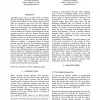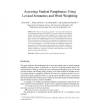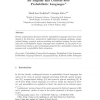250 search results - page 22 / 50 » Learning Probabilistic Models of Word Sense Disambiguation |
ISMIR
2004
Springer
15 years 7 months ago
2004
Springer
Annotating music poses a cognitive load on listeners and this potentially interferes with the emotions being reported. One solution is to let software agents learn to make the ann...
122
Voted
AIED
2009
Springer
15 years 8 months ago
2009
Springer
We present in this paper an approach to assessing student paraphrases in the intelligent tutoring system iSTART. The approach is based on measuring the semantic similarity between ...
141
click to vote
CIKM
2009
Springer
15 years 6 months ago
2009
Springer
Biomedical images and captions are one of the major sources of information in online biomedical publications. They often contain the most important results to be reported, and pro...
144
click to vote
JMLR
2011
14 years 8 months ago
2011
We propose a framework MIC (Multiple Inclusion Criterion) for learning sparse models based on the information theoretic Minimum Description Length (MDL) principle. MIC provides an...
113
click to vote
TCS
2008
15 years 1 months ago
2008
Several mathematical distances between probabilistic languages have been investigated in the literature, motivated by applications in language modeling, computational biology, syn...



